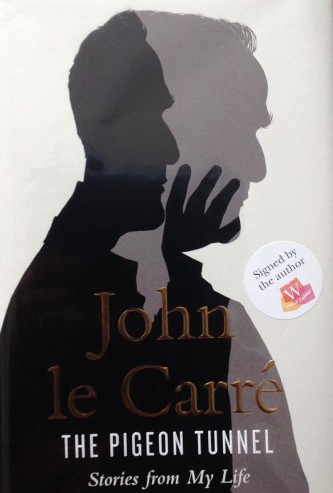Inspiring Older Readers
 posted on 19 Oct 2016
posted on 19 Oct 2016
The Pigeon Tunnel by John Le Carré
I’ve always felt conflicted about John Le Carré as an author – some of his books I really love and some don’t speak to me at all. I think he’s always a great stylist and he can construct novels that are able to take me into worlds and environments that would otherwise be wholly alien – where else would I encounter spies and double agents - but, I think my problem is that I just don’t like him very much as a person.
I also know this is a pretty daft conclusion given that Le Carré the author is just a construct – one of the multiple identities that make up the ‘real’ David Cornwall. But the feeling persists and the more I discover about this complex individual the more I’m convinced I’m right and that I wouldn’t like him. It’s partly about coming from such different worlds – his shaped by the privilege and access afforded by being part of the establishment and mine the mirror image of that world – but it’s also about sensibilities. I don’t share a political or world view with Cornwall / le Carré and so while I can see and appreciate his skill as an author and storyteller I’m often left at odds with or unsympathetic to the dilemmas, both moral and practical, that he and his characters have to deal with. It’s also something to do with the peculiar codes of loyalty and honour that pervade his world, both real and fictional, and the way these have been built on some mutated version of ideas imbued into the public school and Oxbridge educated upper middle-classes.
Le Carré is now well into his 80s and he seems to be allowing his previously closely guarded, even reclusive, personal life to get an outing. He sanctioned a biography a year to eighteen months ago and now with the publication of The Pigeon Tunnel we have a memoir in the form of episodic stories from his past. I have to say that reading it has done nothing but convince me that, yes, he’s a complex character, and that no, I probably wouldn’t like him - and he most certainly wouldn’t give a two-penny damn about that.
The book essentially gives us a series of almost freestanding ‘stories’ from Cornwall/ Le Carré’s past, with the two personas necessarily criss-crossing and mingling with a whole gallery of historical figures he has met and about whom he winkles out an anecdote or paints a brief word portrait. Many of these episodes have been published prior to appearing collected together in this volume and this, I think, adds to the feeling that you’re reading a series of short stories. Some of these are very funny, some droll and some deadly serious; however, all of them are carefully reflected through the prism of the author’s desire to show his hand on his own terms.
I enjoyed Le Carré’s encounters with the famous, the dangerous, the criminal and the egocentric but I think it’s the material on his father that really cuts through and I suspect that it is this that the memoir might well be remembered for most. Clearly his father, Ronnie, was one of that breed of petty middle class crooks - a “conman, fantasist, occasional jailbird” as Le Carré describes him - but perhaps even more importantly he was an abuser who was violent towards his wife, Le Carré’s mother, Olive ( also known by her pet name as ‘Wiggly’) and between them they created an environment in which Cornwall/Le Carré felt deprived of love and affection. It was being deserted by his mother and having to cope with life alongside this father that seems to have had a massive impact, not just on his own stand-offish character but on his ability to create other worlds into which to escape.
Le Carré admirers will gobble this book down but I was left unconvinced. I felt too often that I was being invited to rummage through this box of memories rather like I’d rummage through someone else’s photographs, randomly picking up snaps and having to ask, ‘so what was happening here?’ and having to depend on the owner giving me a version of the past that I wasn’t sure I could always rely on.
Terry Potter
October 2016